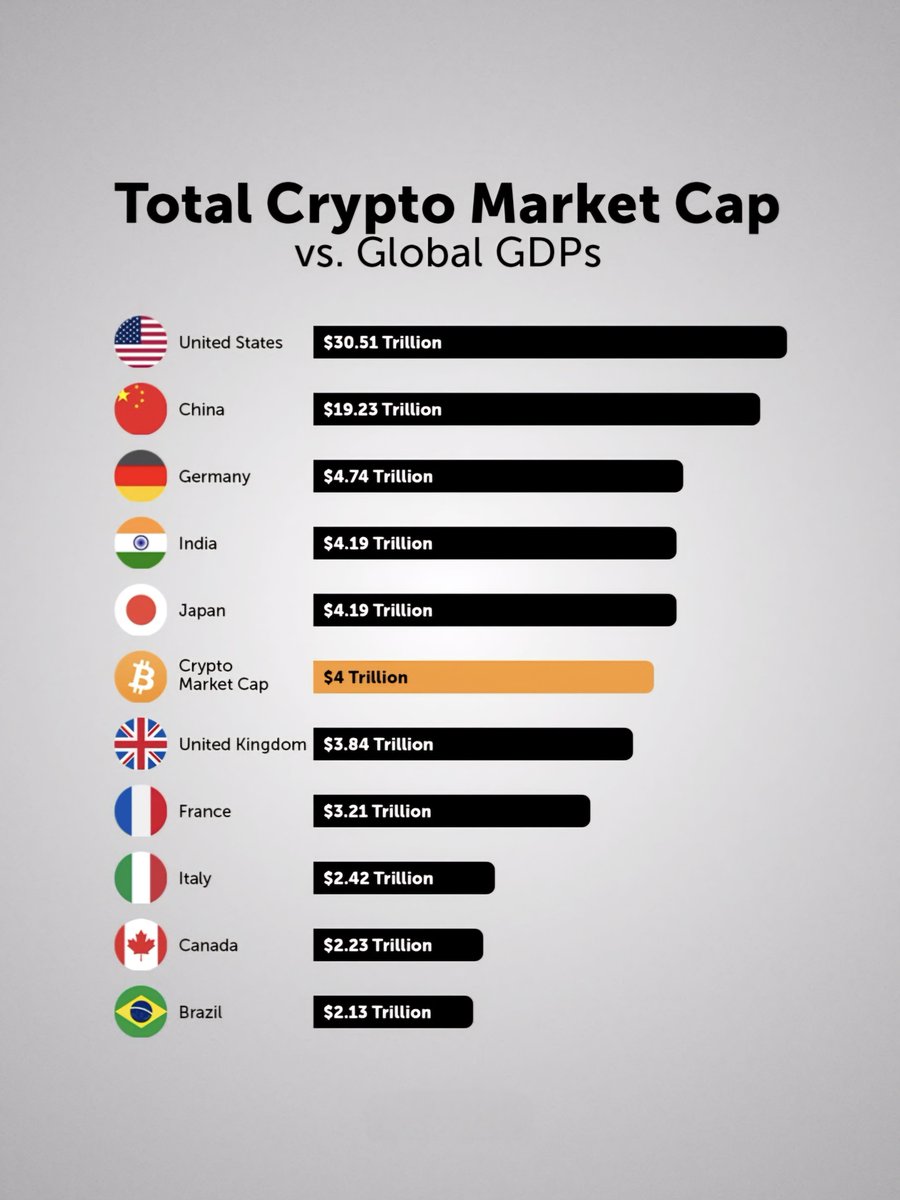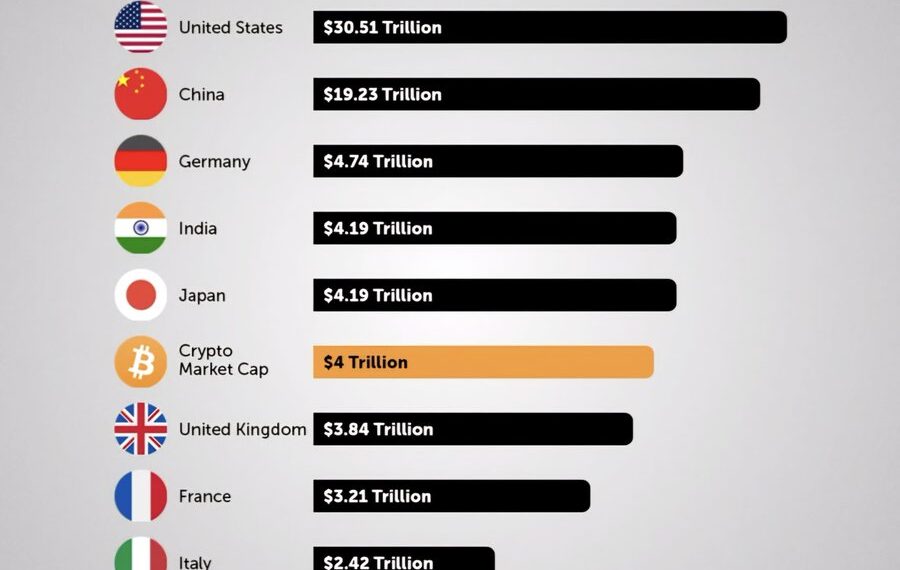Select Language:

Comparing the Crypto Market to Top Global Economies in 2025
1. United States Dominates with a $30.51 Trillion Economy
The United States holds the largest economy in the world, boasting a nominal GDP of approximately $30.51 trillion. Its economic strength spans various sectors, including technology, finance, manufacturing, and consumer services. Interestingly, when juxtaposed with the crypto market cap, which sits around $4 trillion, the U.S. economy is still 7.6 times larger. Nonetheless, the rapid growth of the crypto market reflects its expanding influence within the financial landscape, signaling a potential shift in how wealth is measured and accumulated globally.
2. China’s Massive Economy at $19.23 Trillion
China trails behind the U.S. with a GDP of roughly $19.23 trillion, solidifying its position as the second-largest economy. Its continued industrialization, technological advancements, and domestic consumption drive this massive economic output. Despite this, the entire crypto market’s valuation of $4 trillion exceeds China’s GDP, illustrating how digital assets are sizable enough to rival some of the most powerful economies in the world.
3. Germany and India: Economic Powerhouses
Germany, Europe’s largest economy, contributes about $4.74 trillion in nominal GDP. Its manufacturing, particularly in automotive and engineering sectors, makes it a key player within the European Union. India, with a GDP of around $4.19 trillion, is experiencing rapid growth fueled by technological innovation and a burgeoning middle class. Both economies are substantial players, yet collectively, they are only marginally larger than the total valuation of the global cryptocurrency market.
4. Japan Ranks with a $4.19 Trillion Economy
Japan, with a GDP close to India’s at $4.19 trillion, maintains its position as a vital global economy. Its technological prowess and significant investment in cryptocurrencies and blockchain tech have propelled digital assets into the financial conversation, placing the crypto market’s valuation within striking distance of Japan’s entire economic output.
5. The Crypto Market’s Surprising Standings
The total cryptocurrency market capitalization is currently valued at approximately $4 trillion. To put that into perspective, if Bitcoin alone was classified as a separate country, it would rank as the 9th largest economy in the world with a valuation of about $2.37 trillion. This figure surpasses the combined GDP of several European nations and underscores how digital assets are becoming more than just speculative investments—they are substantial economic forces.
6. United Kingdom and France: Established Economies
The UK, with a nominal GDP of around $3.84 trillion, and France, at about $3.21 trillion, are major players in the global economy. Both countries have increasingly integrated cryptocurrency and blockchain technologies within their financial and technological sectors, contributing to the valuation growth of digital assets, as they become more mainstream.
7. Italy and Canada: Notable but Smaller Giants
Italy’s economy is valued at approximately $2.42 trillion, and Canada’s at about $2.23 trillion. These countries are seeing increased adoption of cryptocurrencies, with a growing number of fintech startups and blockchain initiatives. Their economic figures, combined with the crypto market valuation, highlight a shift toward digital assets playing a supporting role in traditional economic structures.
8. Brazilian Economy and the Growing Crypto Interest
Brazil, with an economy worth roughly $2.13 trillion, rounds out the top nations by nominal GDP in this comparison. Brazil’s burgeoning digital currency trading and blockchain projects underscore the global crossing point where traditional economies intersect with innovative digital assets.
Graphics Highlight: Bitcoin’s Market Cap Surpassing Many Economies

As of July 2025, Bitcoin’s market capitalization has hit approximately $2.37 trillion, making it the 9th largest “economy” if viewed as a country. This extraordinary milestone illuminates how cryptocurrency markets are no longer peripheral but central, rivaling some of the world’s largest economies.
Final thoughts
While traditional economies continue to dominate in overall scale, the crypto market’s rapid growth indicates an evolving financial ecosystem. Digital assets are increasingly seen as valuable and influential, pushing the boundaries of conventional economic metrics. As cryptocurrencies mature, their capacity to complement and, in some cases, challenge established global economic powerhouses will be an area worth monitoring in the coming years.
Remember, these figures are based on nominal GDP and market valuations as of July 2025, reflecting a landscape where traditional finance and digital assets are more intertwined than ever.






